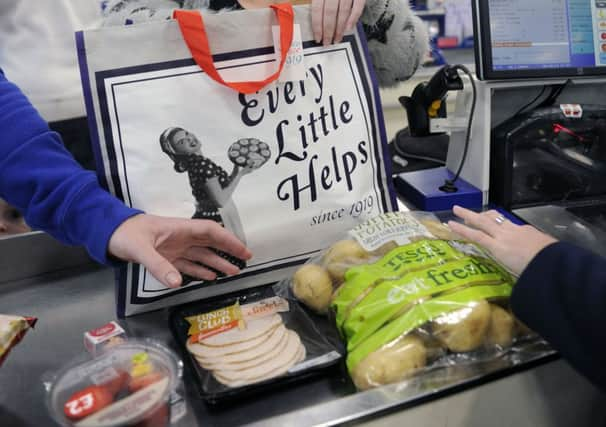Shoppers save £327m in supermarket price battle


With the “big four” supermarket chains battling against the rising popularity of discount rivals Aldi and Lidl, market researcher Kantar Worldpanel said the price of a typical basket of groceries is shrinking at the fastest pace on record.
Fraser McKevitt, head of retail and consumer insight at Worldpanel, said: “All of the major grocers have continued to compete fiercely on price, leading to like-for-like grocery prices falling by 1.2 per cent.
Advertisement
Hide AdAdvertisement
Hide Ad“This is another record low, saving Britain’s shoppers £327 million over the past 12 weeks.”
Sparked by the growth of German discounters Aldi and Lidl, the store wars have led to grocery inflation dropping for 17 months in a row, with major categories such as bread, milk and vegetables witnessing significant price reductions.
The rapid growth of the cut-price chains has come at the expense of Britain’s biggest supermarkets, which have seen their market shares eroded as cash-strapped consumers go in search of bargains.
Aldi now commands a 4.9 per cent slice of the UK’s £174.5 billion grocery sector, up from 4.1 per cent a year ago, while Lidl’s market share has risen from 3.1 per cent to 3.5 per cent over the same period.
Buoyed by that growth, Lidl last month unveiled plans to create 500 jobs this year amid a multi-million pound investment in its Scottish store estate and the relocation of its Livingston distribution centre to a larger site in Armadale.
However, Mr McKevitt said that the discounters may find it difficult to maintain their stellar growth rates as the big four chains compete more aggressively on prices. “Aldi’s growth of 21.2 per cent is still impressive but a relative slowing from its 36 per cent peak in April 2014.
“Likewise, Lidl’s maximum growth of 24 per cent in May last year is now down to 14.2 per cent. Despite this slowdown, both retailers are still taking share from the other retailers.”
Embattled market leader Tesco, which is facing a probe into its treatment of suppliers following last year’s £263m accounting scandal, is to close four stores north of the Border over the next two months, putting more than 300 jobs at risk.
Advertisement
Hide AdAdvertisement
Hide AdAmong the planned closures is a superstore in the centre of Kirkcaldy that employs 189 people.
Yesterday’s Kantar figures showed that the beleaguered grocery giant, led by chief executive Dave Lewis, returned to growth for the first time since January 2014, with sales edging up by 0.3 per cent in the 12 weeks to 1 February.
Mr McKevitt said: “Britain’s largest retailer is bouncing back from a tough year, with Dave Lewis’s efforts to overhaul the supermarket attracting an additional 236,000 shoppers into its stores in the last 12 weeks.”
Sales at Morrisons dipped by 0.4 per cent during the same period, Kantar’s figures show.
The Bradford-based chain, with 11.1 per cent of the market, plans to close ten-loss-making stores this year, threatening more than 400 jobs, but none of those branches will be in Scotland, where it employs 15,500 people across 62 outlets.
Elsewhere in the sector, Asda overtook Sainsbury’s to regain its position as the UK’s second-largest grocer, despite both chains suffering a decline in sales.
Mr McKevitt said that Sainsbury’s tends to perform more strongly at Christmas than the rest of the year, and it now has a 16.7 per cent market share, just behind Asda’s 16.9 per cent.
At the premium end of the market, Kantar said employee-owned Waitrose saw its sales jump 7.2 per cent as it benefited from “a greater focus on price and promotion”.